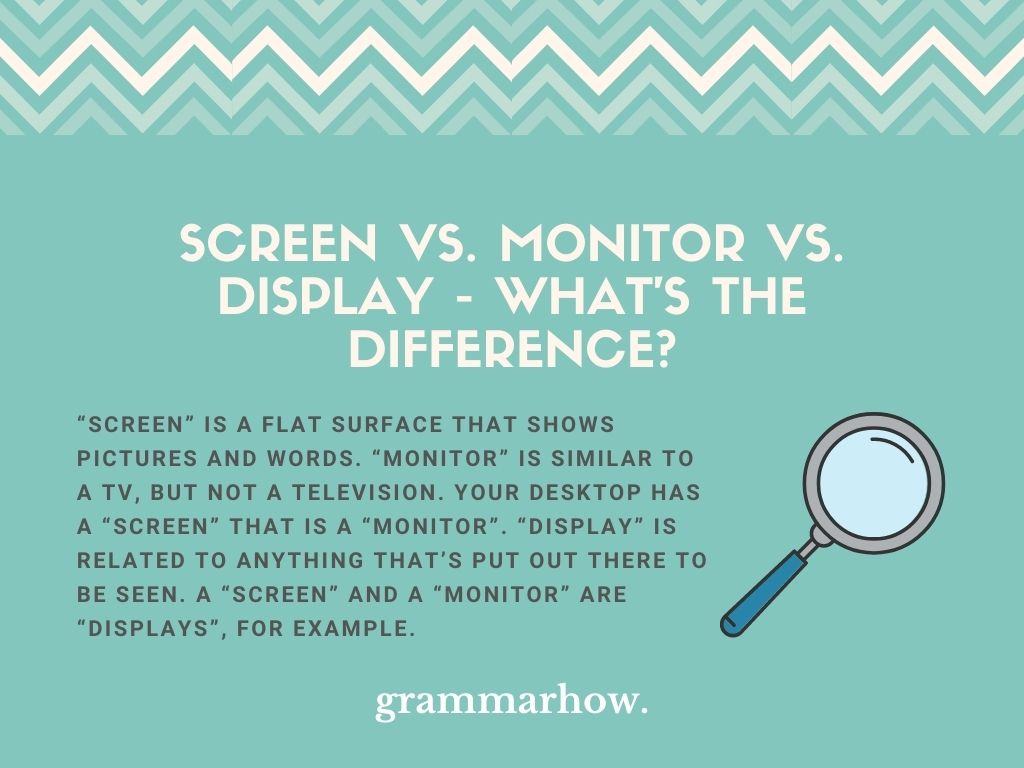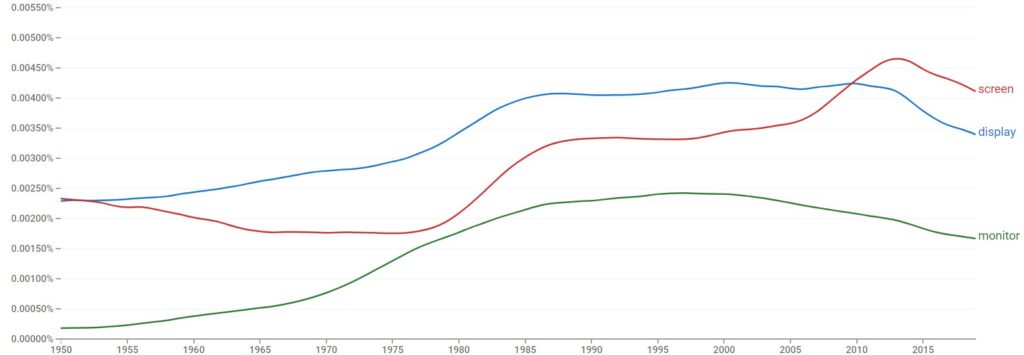Some words have meanings that may sometimes overlap, but it doesn’t signify they are synonyms. That’s the case for “Screen”, “Monitor”, and “Display”.
Let’s take a look at each of these words, to understand exactly what they mean, the difference between them, and what’s the correct way to use them.
Screen vs. Monitor vs. Display – What’s the Difference?
“Screen” is a flat surface that shows pictures and words. “Monitor” is similar to a TV, but not a television. Your desktop has a “Screen” that is a “Monitor”. “Display” is related to anything that’s put out there to be seen. A “Screen” and a “Monitor” are “Displays”, for example.

Does it sound tricky? Let’s look at some examples, and afterwards, look at each word and meaning separately.
- In my opinion, the smart watch screen was too small.
- The desktop’s monitor wasn’t turning on, because it was unplugged.
- The laptop’s display is too bright for me
- The display on my cell phone looked weird, that’s when I knew it was broken.
- I’m looking to buy a TV with a big screen.
- I need a new monitor for my computer at the office.
As we move forward, keep in mind that we’re looking at “Screen”, “Monitor” and “Display” in connection to electronic devices, such as laptops and TVs. In other contexts, those words can have different meanings.
Screen
“Screen” is a flat surface where pictures and words are shown. It can be as big as a movie theater “Screen”, a TV “Screen”, for example. IT can also be part of a computer set up.
As a verb, “Screen” can indicate the action of projecting a movie or a TV show (which usually takes place on a “Screen”, somewhere). Both are the definitions found in The Cambridge Dictionary.
Here are some examples of how we can incorporate “Screen” to a sentence:
- The movie screen seemed too big for an audience of only 5 people.
- Jack’s computer screen cracked yesterday.
- Be careful to not put too much pressure on your computer screen when cleaning it!
- The screen of Ella’s ipad needed fixing for ages.
- Isn’t that screen a bit too small for all of us to watch the show?
- Have you put a screen protector on your phone yet?
“Screen” is simply the word we use to identify the flat surface where we see things displayed and projected. But where does “Monitor” and “Display” fit into this context?
Monitor
“Monitor” is a computer “Screen” or device where words and pictures can be shown. All “Monitors” are “Screens”. However, not all “Screens” are “Monitors”.
The word “Monitor” indicates a smaller surface, on a device you can have at home or at the office. You wouldn’t call the big “Screen” at the movies a “Monitor”, because it’s not. You also wouldn’t use the word “Monitor” to describe a TV.
Still, the screens on most of your devices at home could be called “Monitor” as well.In The Cambridge Dictionary this is the definition we find. And we want to look at some examples of how to use “Monitor” in a sentence, to illustrate it better:
- The monitor isn’t turning on because you forgot to connect it to your computer.
- That monitor was almost as big as my TV.
- Tyler bought a new computer monitor yesterday.
- Is it worth it to fix the monitor, or should I just buy a new one?
- Ryan has four different monitors connected to his computer.
Usually, the word “Monitor” is used to refer to a computer’s “Screen”, be it a desktop or a laptop. Perhaps this is the most frequent use of the word in that context. However, it’s not the only one.
And how about “Display”? Let’s see how this word fits into this conversation.
Display
A “Display” shows pictures and words, sharing information, electronically. All “Screens” and “Monitors” are also “Displays”, because through them we can see and watch things.
The definition in The Cambridge Dictionary is that a “Display” is the way in which “words, pictures, etc., are shown electronically, for example on a computer screen”.
Here are some examples of how we can add “Display” to a sentence:
- The display wasn’t showing the correct data.
- The display of her smartwatch was so small that it was hard to read.
- Herald told his wife they needed a computer with a larger display.
- I love the laptop’s display because it’s super vibrant.
- Is there anyway the display can be fixed?
Since “Display” has a broader meaning, that actually includes the words “Screen” and “Monitor” under its umbrella, it’s very likely that you could replace the word “Display” in those sentences for at least one of the other two.
What you have to keep in mind is how specific you wish to be when sharing a story, or asking a question. The level of specificity you want to add to your conversation is what will determine if you want to speak about “Displays” generally or, more specifically, about “Screens” and “Monitors”.
Display Monitor
We call a “Display Monitor” any electronic device used to display video outputs from computers. Does it sound redundant? It probably is, but since this nomenclature has been attached to a kind of product, it’s possibly a name we’ll continue to see around.
Here are some examples of the use of “Display Monitor” in a sentence:
- Tom is looking to buy a 32” display monitor.
- What’s wrong with the display monitor? It’s not showing the video.
- I’m looking for a medium size display monitor for my office wall.
“Display Monitor” refers to a specific kind of device, a product sold at stores. In fact, these days, it’s a category you’ll find in any electronics store. Unlike the words “Screen”, “Monitor” and “Display”, the combination “Display Monitor” only fits very particular scenarios.
Which Is Used the Most?
Which one of three words is used more often, “Screen”, “Monitor” or “Display”? Let’s find out by taking a look at the graph from Google Ngram Viewer below.

As a matter of fact, “Monitor” is the one that’s less used. Since its meaning is the more strict of the three, it makes sense that this would be the case. As you can assume, the broader the meaning of a word, the more it’ll be used.
It’s interesting to see, though, that between “Display” and “Screen”, until fairly recently, “Display” was used more often. It changed between 2005 and 2010, when “Screen” became more common.
If you were to guess, why do you think this is the case? We think that “Screen” has become more incorporated into our daily lives, recently. Until 2010, for example, expressions like “screen time” (to refer to how long we stay connected to our devices) didn’t even exist.
Final Thoughts
“Screen”, “Monitor” and “Display” are words with similar meanings that often overlap. However, they’re not exactly the same. All “Monitors” are “Screens”. And all “Screens” are “Displays”. Now, how you use those words will depend on how specific you wish to be, in your communications with people.

Martin holds a Master’s degree in Finance and International Business. He has six years of experience in professional communication with clients, executives, and colleagues. Furthermore, he has teaching experience from Aarhus University. Martin has been featured as an expert in communication and teaching on Forbes and Shopify. Read more about Martin here.
